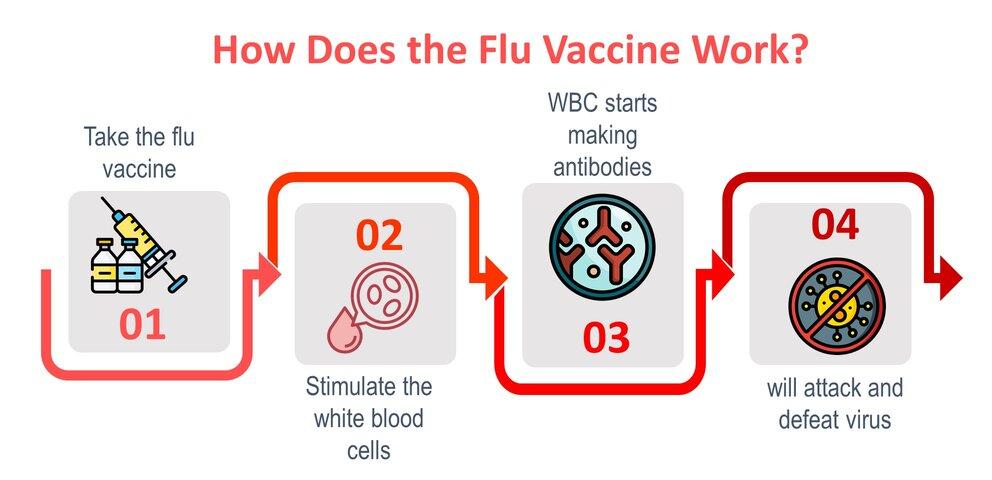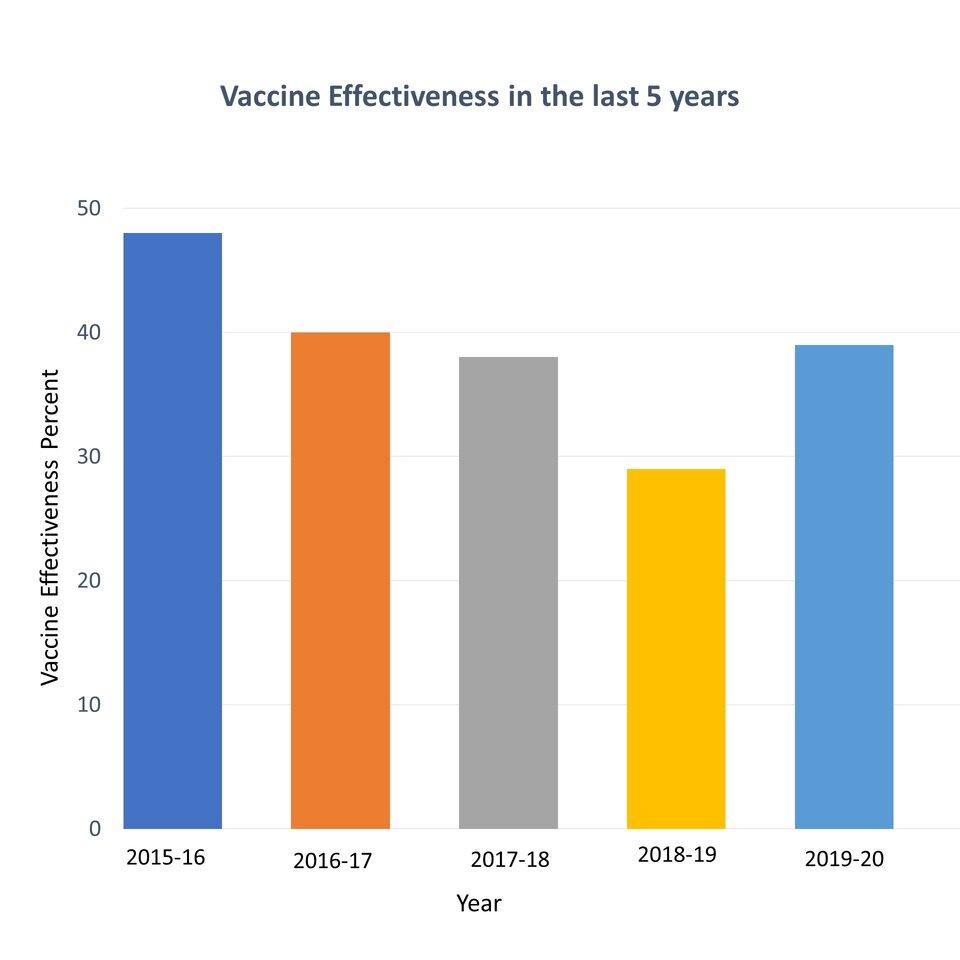Introduction
The flu season is here. You may not feel it much now. But just let a month go by, and you’ll start feeling the chill. The cold breeze is coming, and so are the constant sneeze and fever.
Do you know how you can be ready for this season? We have some preventive measures shared with you in the past. And now, we’re going to focus on the first and most important task on the list.
Why Flu Vaccine Is Necessary for Seniors?
And in times of the Covid-19 pandemic, flu contamination has become scarier. It is highly contagious. And so, the chances of spreading it to someone recovering from Covid is also high.
Thus, a flu vaccine for seniors is an absolute necessity. Yet, it is often looked down upon at the senior care facilities. Most people are confused about it as well.
So, we will focus on convincing you for the influenza vaccine with some pros and cons of flu vaccination.
Flu Season Over the Years
Every year, the flu season begins in September. CDC estimates the season to last till the end of March. But the severity can vary depending on your location.
In some cities, winter comes at the end of October. And it can last only a few weeks. The severe cold is the leading cause of flu. And so, you never know when you can get affected by the Influenza virus during this period.
The same thing is expected to happen this year as well. If you are not ready to fight the virus, you will catch a cold. There are many warning risks of catching the flu.
The best way to fight it is to get the vaccine as soon as possible. And it is valid for people of any age. Seniors are more at risk. And so, getting the vaccine is much more critical for them.
Flu Risk Among Seniors
According to WHO, people over 65 years of age are at a high risk of catching Influenza. As a result, they are more prone to seasonal flu than others. There are a couple of reasons behind this. We have accumulated them into 2. These are as follows:
1. Their age
The first reason is their age. People over 65 have weak immune systems. This makes them prone to many diseases. And flu is just one of the many.
The weak immune system causes elderly people to be more at risk of the Influenza virus. This is because the virus goes inside their body, and the immune system cannot work to fight it. As a result, they often get sick with seasonal fever, cough and cold.
2. Underline diseases
Seniors have many underlying diseases. Their age and their faulty immune system make them carry different medical conditions. This can include asthma, dementia, diabetes, lung disease or others.
These already existing diseases make them prone to flu as well. This is because they already have weak immune systems. And their immune system is deteriorating every day from the medical conditions.
Another example can be having breathing issues. If an elderly person has breathing issues, it can take a serious turn during the flu season. They may have a severe asthma attack from the flu virus contamination.
Flu Vaccination for Seniors during the Covid-19 Pandemic
None of us can remember a time without Covid-19! It may have been only one and a half years ago when the deadly virus didn’t shake our lives. But even today, Covid-19 has an important place in our flu vaccine discussion.
The primary problem in diagnosing the two is their symptoms. Both Covid and flu have similar symptoms. As a result, it is not unreal to be confused with which vaccine actually to take when the symptoms are quite similar. So the question may arise, does flu vaccine work for corona virus? Unfortunately, normal flu shots do not provide much protection against COVID-19, and even if it does, that may not last long.
Anyone can think that their symptoms are of seasonal flu. This can make them decide not even to consider Covid treatment. But they may have been affected by the coronavirus. In such a case, taking the flu vaccine has completely zero benefits to fight against Covid-19.
So, the primary factor to consider is the pre-treatment. Whenever you feel bad during this season, check up with your doctor. If both you and your doctor feel the need to test for Covid, do it. And then, quickly get the vaccines for your treatment. We can assure you that none of the vaccines are bad for you.
But you must make sure that you take the suitable vaccine during the pandemic situation.
What Are the Types of Flu Vaccine for Seniors?
We’re on the main topic now. The flu shot vaccine for older adults is different from other aged people. People under 65 years old can take either a shot or a nasal spray. But it is not that simple for seniors over 65.
CDC has designed 2 distinctive vaccine shots for seniors. This age group of people can take any one of them. Here is a brief discussion on the best flue vaccines for seniors:
1. Adjuvanted Flu Vaccine
The brand of the Adjuvanted flu vaccine is Fluad Quadrivalent. This vaccine is made from MF59 Adjuvant. The specialty of this additive is that it enhances the immune system.
As a result, seniors will experience a better fighting response to the Influenza virus. It first became available in 2016-17 in the US.
2. High-dose flu vaccine
The second kind is the high-dose flu vaccine. This vaccine contains 4-times more antigen than regular flu vaccines. Thus, it works to strengthen the immune system more than the previous one.
This vaccine has been approved to use among seniors since 2009. As a result, elderly people can expect to experience a significant increase in immunity against the Influenza virus.
How Does the Flu Vaccine Work?
So, you took the flu vaccine. Is it working? Are you concerned about its reaction to your body? You will need to know how it works to get rid of all the confusion.

So, how does the flu vaccine work? The vaccine starts working in your body after 2 weeks of the shot. The first thing it does is to stimulate the white blood cells (WBC). After that, WBC starts making antibodies to fight the virus.
The antibodies will flow through the body for the next 6 months. Whenever they notice the Influenza virus, they will attack and defeat it immediately. After 6 months, they will die away. But this time, the B Lymphocytes will produce the antibodies quicker.
How Often Should Seniors Get Flu Shots?
How long does the flu vaccine last? We already know that the flu vaccine creates antibodies that can stay in the body for 6 months. But the main question is- will you have to retake the flu shot in your life?
The answer is yes. The first thing to consider is that the flu vaccine may last less in seniors. So, the vaccine may wear off earlier than you might think.
Thus, experts suggest that everyone should get a flu shot once a year. It means that if you take the vaccine by the end of October, you are good to go for the next 1 year. Then, you can again get a vaccine in October 2022, and so on.
Flu vaccine effectiveness
The effectiveness of the vaccine depends on quite a few factors. Among them, age is the most significant one. The older you get, the faster the vaccine will wear off.
Also, the mutation of the virus is a crucial factor here. The virus may change, and the vaccine may no longer work. Thus, professionals develop better variations each year.
Here is a complete chart of the flu effectiveness percentage among seniors in the last 5 years:

Source: CDC
How Safe Is Flu Vaccination for Seniors?
This is one of the significant concerns among seniors. Is the vaccine safe for any age group of people? Well, it is safe for seniors. But there can be some mild side effects, like redness or swelling in the shot area or muscle ache, etc.
Another common question is- can the flu vaccine give you flu again? The vaccine is designed to tackle the virus by creating antibodies in our bodies. So, it is absolutely impossible to get flu again after the vaccination.
But, as mentioned already, the effectiveness of the virus will wear off faster for seniors. As a result, you may feel the vaccine stop working after 8-10 months. In that case, you will again have to get a flu shot.
What Are the Side Effects of Flu Vaccine for Seniors?
So, you know that flu shot is safe. But there are some flu vaccine side effects that you need to be aware of. Any vaccine can have side effects. Here are the ones that a senior may experience:
- Mild fever
- Headache
- Muscle pain
- Fatigue
- Nausea
- Soreness, swelling, tenderness and redness on the vaccine spot
Pros and Cons of Flu Vaccination for Seniors
It is understandable to be scared of the side effects. You are getting old. And you may worry that the risks may be drastic. We assure you it isn’t at all.
Yet, any vaccine has some benefits and disadvantages associated with it. So, here are some pros and cons of flu vaccination for seniors.
What Are the 5 Pros of Flu Shot?
If you want to protect your health during winter, there is no alternative to the flu vaccine. It has a lot of benefits. Here are 5 of them:
1. Flu prevention
The first benefit is the most obvious one. Getting a flu shot means that you are protected from the Influenza virus. Flu vaccination prevents seniors from flu contamination until the following winter.
How does this work? Well, you should already know this if you’ve come to this part.
2. Even if you get flu, it will be less severe
Yes, getting flu after a flu vaccine is near to impossible. But no one can give you a 100% surety. So you may still get the flu after the vaccine.
But this time, the flu symptoms will be less severe. You may not even realize that you have the flu. This is because the immune system is much more vital to fight against the virus now. As a result, you may feel mild signs, but they will disappear when the body creates enough antibodies.
3. You will be away from hospitals
Flu cases are mild, and you won’t need much medical treatment. Yes, you may have other underlying medical conditions. But you won’t have to go to hospitals for flu to the least.
Each year, many people have to be rushed to hospitals for flu treatment. And a majority of them are seniors over 65 years of age. The cases are so high because only a handful of the seniors get flu shots before the flu season arrives.
Don’t worry, you still have time if you haven’t gotten the shot. Get the flu vaccine before the end of October, and you will be good to pass this winter.
4. The vaccine saves you future expenses
Let’s face it, medical treatments are not cheap. It involves a high amount of costs for medicines, operations, nursing care and many more. So, why not get the flu vaccine and stay away from all these expenses!
The flu vaccine has the potential to save a lot of your money. And do you want to know something more interesting? Your insurance might just cover the costs of the flu shot as well.
Check it out with your insurance provider without any delay.
5. The vaccine protects others
By now, you already know how important it is to be vaccinated. It is not for you only, but also for the people around you. Any vaccine protects others from getting your virus.
When you are vaccinated, you gain herd immunity. This means that you are less likely to spread the virus to other people. As a result, you are protecting others by getting the flu shot to yourself.
What Are the 3 Cons of Flu Shot?
The flu vaccine has many benefits. The list of pros just proves that more. But there are some disadvantages as well. So here are only 3 cons of flu shots that our research could come up with!
1. The side effects
You are almost completely risk-free from the flu. But some side effects can give you trouble. The good news is that you will feel them only for a few days. And sometimes, it might not even go beyond a day.
Check the Senior Flu Vaccine Side Effects section to learn more about the side effects.
2. Still may get the flu
It is nearly impossible to get flu again after the flu shot. But mind the word “nearly”! Nobody can confirm that you won’t get the flu. So, you aren’t entirely immune. You just have a much better immune system to fight the virus now.
3. The Guillain-Barré syndrome (GBS)
Influenza vaccine can trigger the Guillain-Barré syndrome in your body. What is this syndrome? The GBS is a condition where the immune system attacks the peripheral nerves in our body.
The GBS is a very rare medical condition. The flu shot is something that can influence it. Some doctors say that you shouldn’t get the flu vaccine if you have GBS. So, it is always better to consult with your doctor before getting the shot.
– it prevents seniors from getting flu
– it protects others from influenza virus
– it helps lead seniors a healthier life
Flu vaccination for seniors is necessary:
Conclusion
Flu vaccination for seniors is very important. Everyone realizes that it is a pretty standard thing to do. But still, seniors often don’t take it seriously.
The major fear they have is about the side effects. You may think that the aftermath of the shot can be dangerous for you. But that is not the case.
Any vaccination has its pros and cons. If you evaluate between the two, flu vaccination will always have more health benefits. The minor issues should not be a headache to any senior.
You can also reach out to our website for any senior healthcare support.

